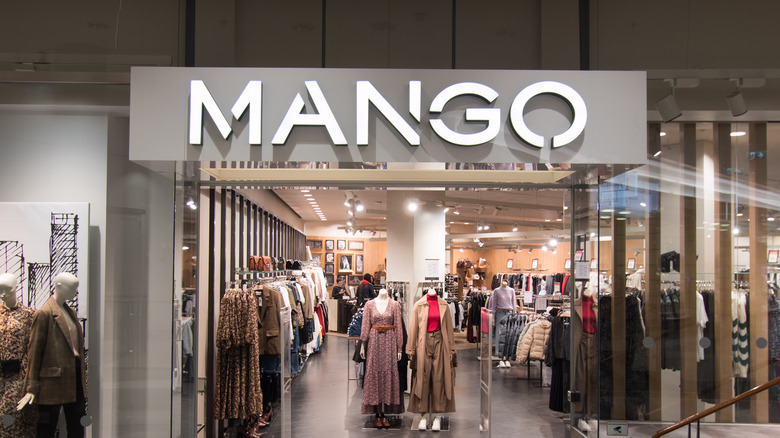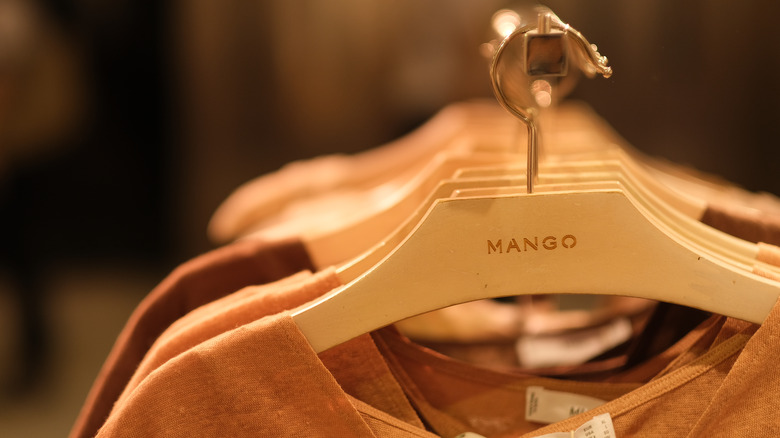The Reason You Should Avoid Shopping At Mango
Shopping is easier than ever. With the click of a button, you could purchase a whole new wardrobe faster than it takes to drive to the mall. Another fast-paced fashion situation that isn't as useful (in fact, it's the opposite) is the concept of "fast fashion," where brands are quickly producing cheap clothing to cater to celebrity influence and current fashion trends, per Good On You. Why is fast fashion bad, you ask?
When you consider that humans are purchasing more clothing than ever before — about 400% more when compared to 20 years ago — and wasting an individual 82 pounds of discarded clothing per year, you can begin to see why, per Sustainably Chic. Top that off with underpaid and overworked garment workers, negative environmental impacts, and animal harm. One question remains: are these types of companies worth your money?
There are several fast fashion brands you should avoid supporting, which will ultimately slow down the threatening trend of clothing overproduction — one of which is Mango. With retailers in over 110 countries around the globe, it's an incredibly popular brand — with a lot of harmful business practices.
Although Mango has made progress to be more sustainable, it lacks in many ways
Giving credit where it's due, Mango has made a decent shift toward sustainability, implementing natural cotton and recycled materials into some garments, via Sustainably Chic. Mango has even taken steps toward eliminating other toxic materials in its clothing, like polyfluorinated chemicals, which are extremely harmful to the environment and wildlife, via Centers for Disease Control and Prevention (CDC).
However, even though Mango has disclosed the number of greenhouse gases their factories emit, they have made no effort to lower the number, via Earth.Org. They also have a long way to go regarding environmental friendliness, as only 44% of their 18,000 products are made with sustainable materials — with over half continuing to play a part in the rise of environmental issues, per Earth.Org.
What's more? Mango's code of conduct reveals that their garment workers are paid at the "legal minimum, not the recommended wage level," per The Independent. And when over 1,000 garment workers from 29 brands, including Mango, were killed in a building collapse in Bangladesh in 2013, a fund was created to compensate the families. Among the 29 companies involved, only nine offered monetary compensation and donations — Mango not being one of them, via Earth.Org.
How to spot a fast fashion clothing brand and where to shop instead
We're sorry to report that some of your favorite retail stores are on the fast fashion clothing list, like Nike, Urban Outfitters, and H&M, per Earth.Org. You'll know a brand is participating in the dangerous fast fashion trend when the clothing items are made of cheap and low-quality materials, like nylon and polyester, via Panaprium. With a focus on what's trending, fast fashion brands pump out new garments in high quantities. A lot of the clothing is easy to access, cheap to purchase, and comes in several styles and colors.
For those who want to be more eco-conscious and support sustainable brands and clothing, it's important to remember that you don't have to revamp your entire wardrobe immediately, via The Good Trade. Instead, start slow and intentional with the products you purchase, keeping a close eye on organic and green materials. Brands like Adidas, Mara Hoffman, Patagonia, and Levi's are great options to start out, per Glamour. The price may be higher than fast fashion, but that's the point. By consuming eco-friendly brands with higher-quality materials and a timeless style in mind, you can wear the clothing for years to come, not just until they go out of style next year — helping the environment one garment at a time.


